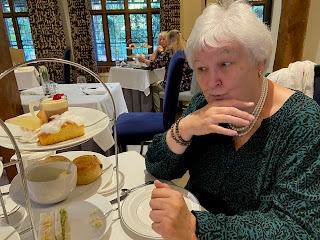Several unexpected events jumped into our lives this week. First to happen, the hot water system went off, discovered when Ann came down from a tepid bath. Our plumber said a valve had failed; he has ordered a replacement but is yet to return to fit it, so we are using the inefficient immersion heater as a standby.
Then early yesterday, I was woken at 4 a.m. by a loud crash from the wardrobe as Ann slept peacefully on. Having listened in case it was a burglar, my guess was a hanger had given way and some clothes had fallen down, so I went back to sleep. Later, Ann came to tell be the whole rail had collapsed; all her dresses were in a heap, so I was out early to buy a new rail and fittings as Ann sorted through and reduced her stock considerably, to the benefit of the charity shops.
 |
| Afternoon tea at the Swan, Lavenham |
In the afternoon, we are in Lavenham for an afternoon tea at the Swan, a splendid Tudor coaching inn at the heart of England's most unspoilt medieval town. The tea is a treat for Ann's birthday from Richard and Chris; it is over four months since the birthday, but the long delay is ours: the gift card was sent on time but we have been busy, and anticipating our delayed gratification in this splendid dining hall. We are greeted by the maître-d' in his elegant suit and waistcoat, who informs us to proceed to the desk in the restaurant whence we will be shown our table. At the desk, I am greeted again and give our names; "Yes sir, I know", he said. Ann whispers to me, "it's the same man, idiot!". He had raced through the kitchen and popped up at his other desk before we reached it, but I hadn't noticed. This often happens in our lives: Ann is far more observant than I, especially when it comes to people. Perhaps it's a woman thing; Ann always says women make the best spies. Little seems to escape their eye, and Ann certainly always seems able to read my mind just from my expression or body language; nothing escapes her. No wonder some women used to be considered witches; they appear to possess the ability of second sight.
A phone call from the consultant's secretary to ask when I will be free to speak to him sets alarm bells clanging ominously. Sure enough, he phones to say my recent scan shows a recurrent growth on one of the lungs. I wait to tell Edwin, hoping not to spoil their holiday in Africa, but conscience beats back caution, as we have always promised to not keep anything from him, so I say that a cyst has been found on the lung. He immediately replies, "how big is the tumour?", for like his mum, he has great insight into people and events. I tell him "six centimetres diameter." He sends sympathy, and a fine picture of wild penguins bathing off the rocks on Robben Island. He is now at Victoria Falls, where I note there are such wonders as the Elephant Walk, Rainbow Hotel, Lookout Cafe, The Three Monkeys Restaurant, and Shoestrings Backpackers' Lodge. It all sounds very American commercial.
Strangely, despite the recurrence, I feel fine with the little pain controlled with paracetamol. True, I get breathless walking up slight hills, but on the straight it is more the pain in my feet and legs that limits me, rather than the lungs. The future is clearly uncertain (well, the timing I mean; the outcome is all too certain!), but I continue to enjoy life, write this blog, and do as much as I can in the world. One advantage now is that major events seem to pass me by as I ignore the looming world catastrophes, for I will probably not be around to see their outcome.










